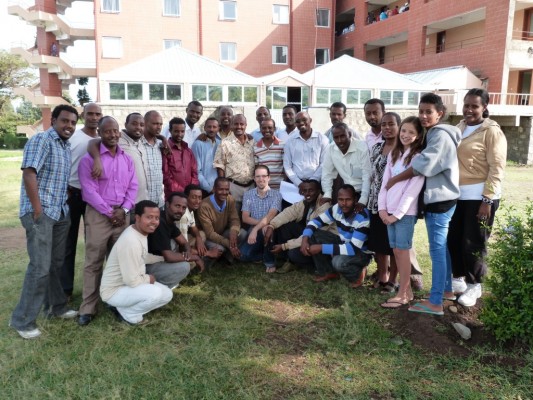
Nearly three years ago, in the fall of 2008, I had just started the four-year saga known as “the dual-degree program” at EMU, between the Center for Justice and Peacebuilding (CJP) and the Seminary. There I was, a small-town Iowa boy, learning conflict analysis with Lisa Schirch and restorative justice with Howard Zehr. Around me sat peacebuilders-in-training from all around the globe. My cohort that year had an especially high number of students from across Africa. One of those students, Solomon from Ethiopia, took an interest in me and we quickly became friends. By the end of that first semester, Solomon was encouraging me to think about something beyond my wildest Midwesterner’s dreams: “You should come to Ethiopia.” Last year, when Solomon was graduating with much of my cohort, he introduced me to his visiting family: “This is Brian Gumm, and next year he is coming to Ethiopia to teach!” Solomon, it seems, had done the work of selecting my CJP practicum, often a daunting task for CJP students. Two months later, the end of last summer, it was official: In July 2011 I would be teaching “Intro to Conflict Transformation” at Meserete Kristos College in Debre Zeit, Ethiopia.
My family and I have only been back from this amazing experience for three days and there is much that I have to say about our month there. But for the purposes of this post, I want to focus on one thing: The wonderful humility, patience, and cultural sensitivity that the CJP teaching style exhibits and invites, and how it helped make the experience of this first-time teacher in a brand new culture go smoothly.
Students who come to CJP often notice something very different in the classroom within the first week. CJP professors describe their students as “colleagues masquerading as students.” Professors don’t spend the entire class period lecturing. They invite students to ask a lot of questions and conduct long discussions as a class or in small groups. For some students this can be unsettling at first, but by the end of the first semester when a group dynamic has gelled, most see the deep wisdom in this “elicitive” model of teaching, an approach that dares to let knowledge creation and learning happen in the collaborative dance between instructor and student, materials and activities.
So when I went to Ethiopia last month to teach, this is the style of teaching that I took with me. Because I was warned that my students would be used to Western teachers using traditionally Western methods, I spent time on the first day of class making explicit how I was and was not going to be teaching the class. Part of my explanation was bare honesty: As a first-time teacher in a new culture, I needed to teach this way, because I had just as much to learn as the students. It worked. As part of my “monitoring and evaluation” process for the class, I handed out evaluation forms to all students at the end of each of the three weeks of class. This feedback helped me adjust the content and form of the class to better suit the pace and interests of the students. The most consistent topic in all three weeks of class in the comments section had to do with my teaching style and how (most of the time) it was working well for the students. One student remarked, “You are a new teacher but you teach like an experienced teacher.” Others noted their surprise that a Westerner could teach this way because, for instance, “you see us as a brother.”
There is something truly remarkable about the pedagogical style of the CJP. To be fair to the broader EMU institution – where I see similar sensitivities at work – this style reflects some long-held attitudes and practices of the Anabaptist tradition, in which EMU finds itself. Humility and patience are, after all, Christian virtues that Anabaptists have typically faithfully inhabited. That these functioned in the way I taught and had such a positive impact on my first teaching experience is something I’m very grateful to CJP for showing me first-hand.
On the final evaluation form, one of my students wrote: “I encourage you, please come back and teach in this college.” What better encouragement could an Iowa boy ask for in such circumstances?
 [Brian Gumm is the co-editor of the Peacebuilder Online blog for Eastern Mennonite University’s Center for Justice and Peacebuilding (CJP) and is also a student in EMU’s dual degree program between the CJP and Seminary. More on Brian’s teaching practicum in Ethiopia can be found on his personal Restorative Theology blog.]
[Brian Gumm is the co-editor of the Peacebuilder Online blog for Eastern Mennonite University’s Center for Justice and Peacebuilding (CJP) and is also a student in EMU’s dual degree program between the CJP and Seminary. More on Brian’s teaching practicum in Ethiopia can be found on his personal Restorative Theology blog.]

Thanks for the reflection on the teaching style. If we really want to be a “community” of learners we need methodologies and structures that make “community” possible. I’m glad you shared your experience. It’s a good example of how the methodology works.
Brian, I’m glad to hear that all went well for you and your family in Ethiopia. Thanks for sharing a bit about your amazing experience and hopefully I’ll get to hear more once school starts again in the fall.
All the best!
Brian, it was good to read about your experience. I recognized many of my students in your picture. A wonderful group of students. It sounds like you and I took fairly similar approaches to teaching.